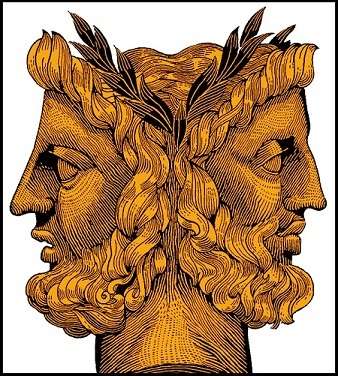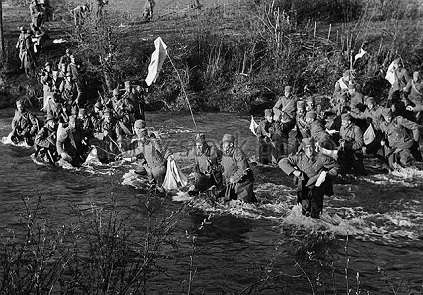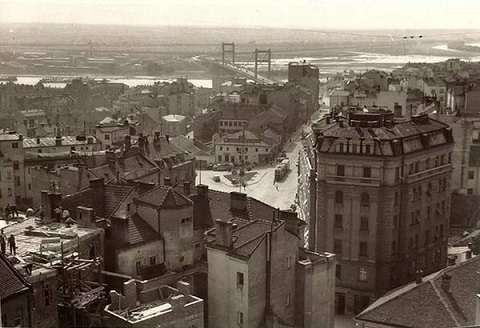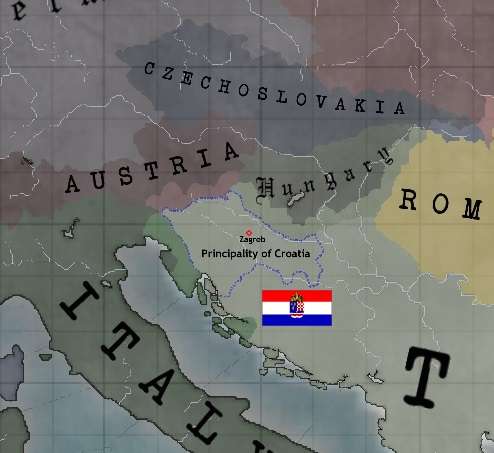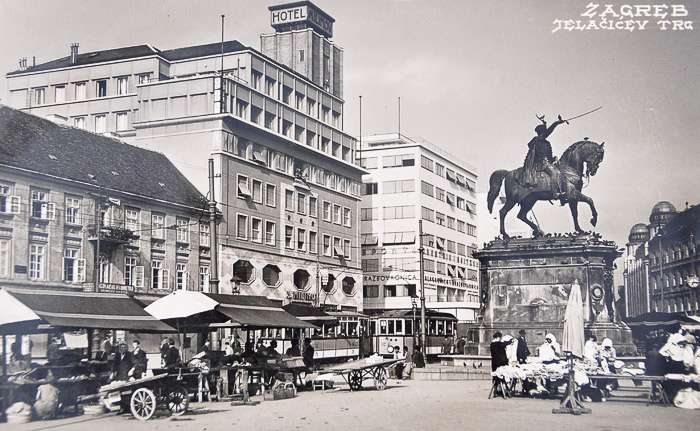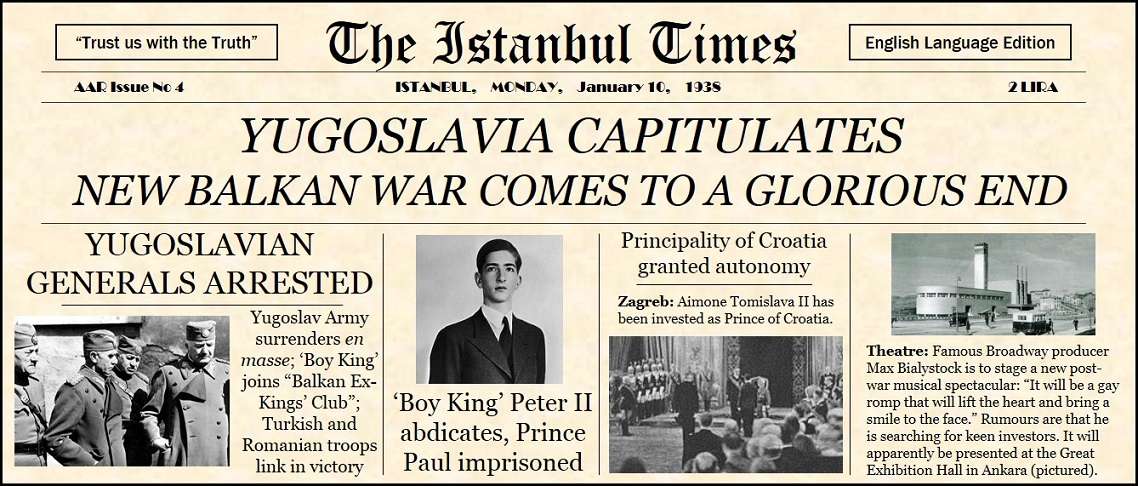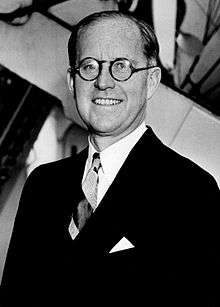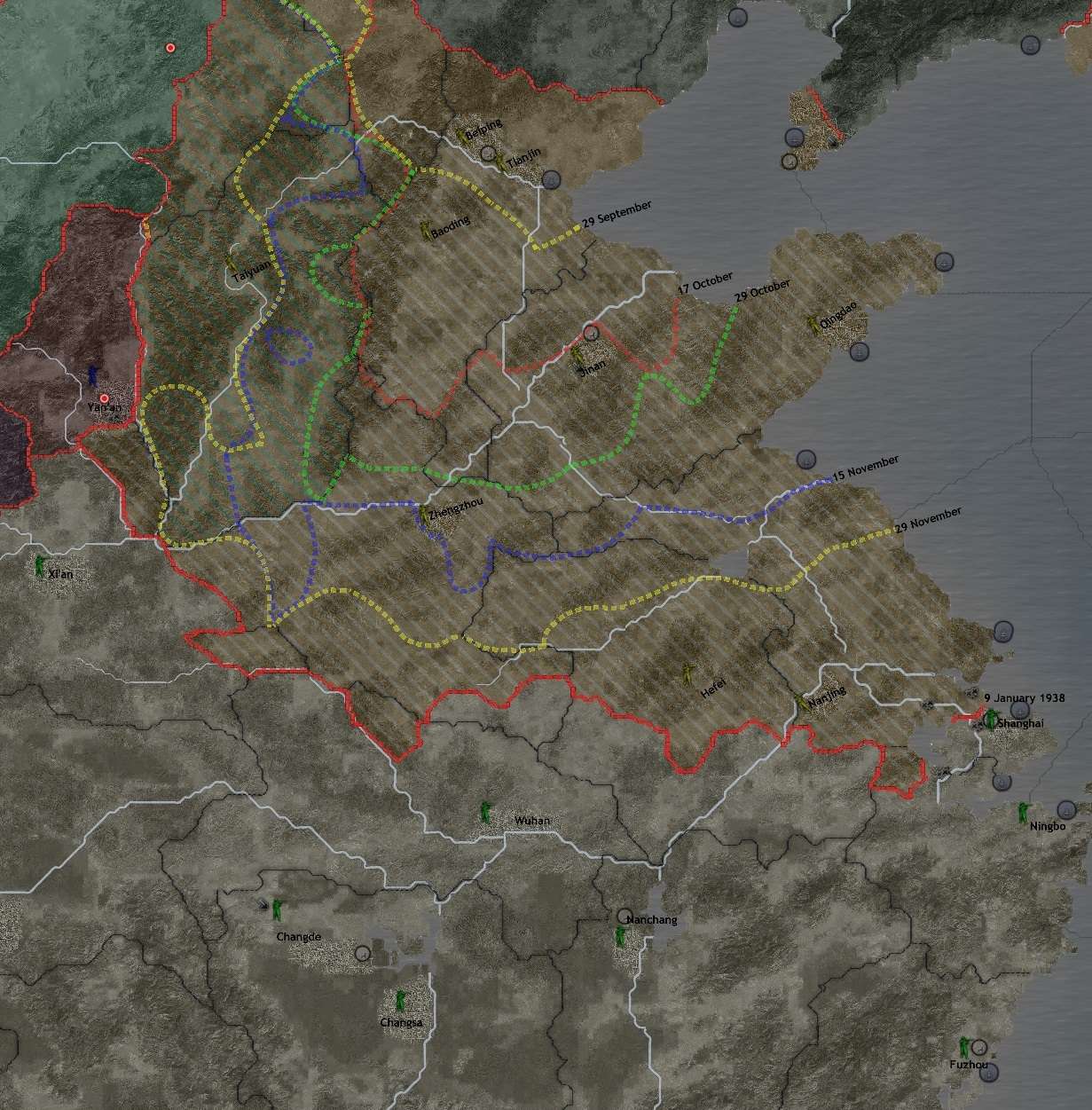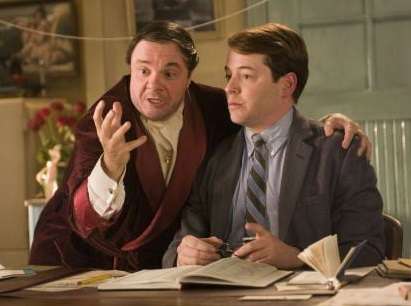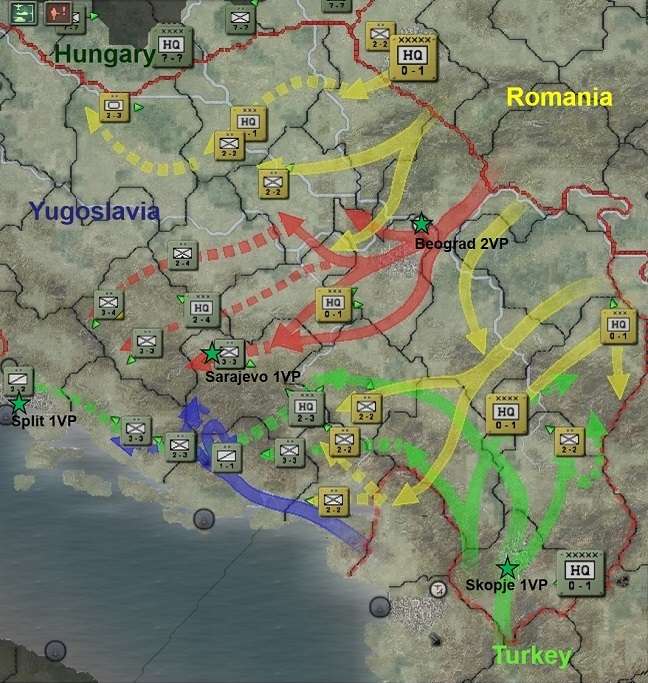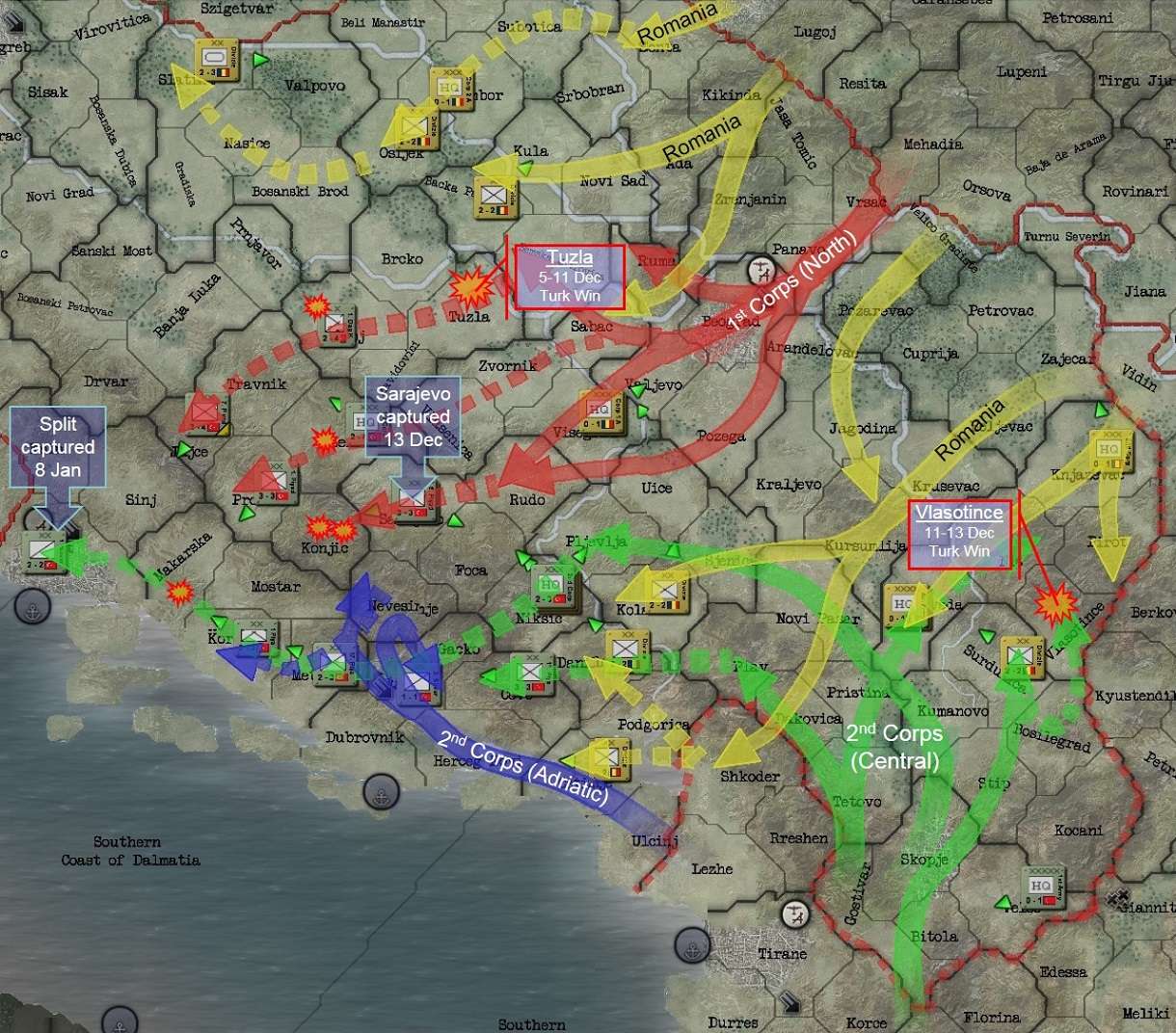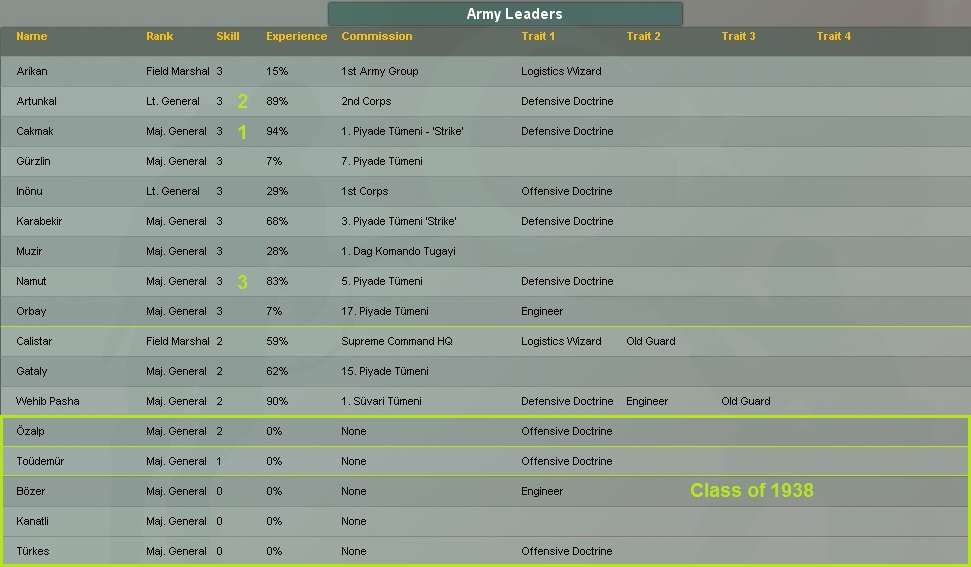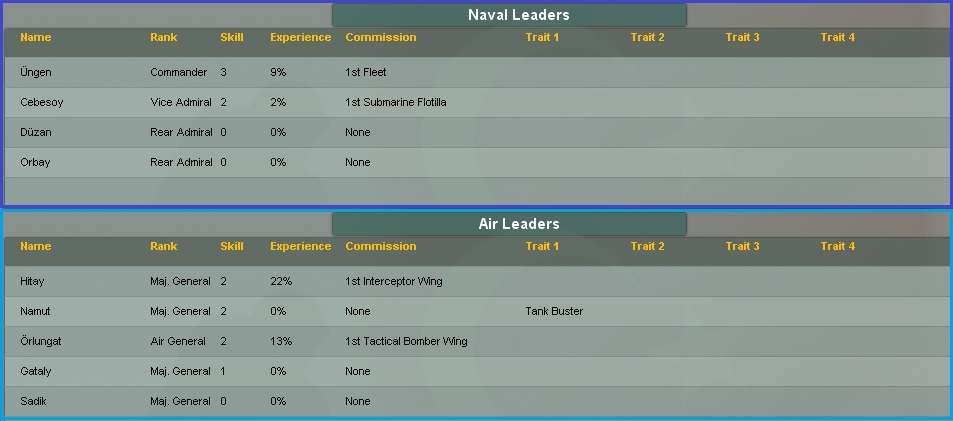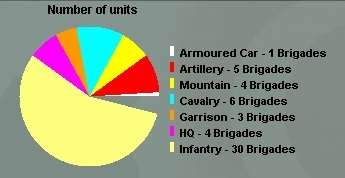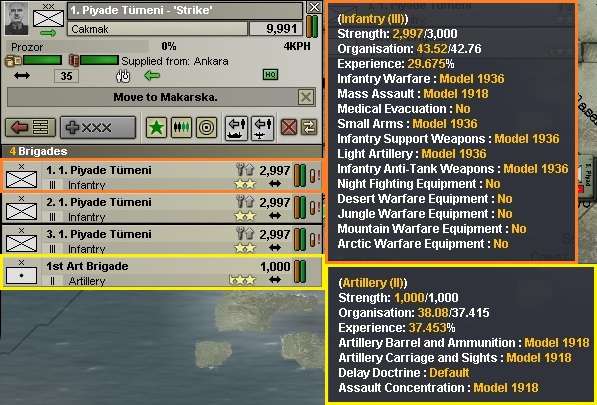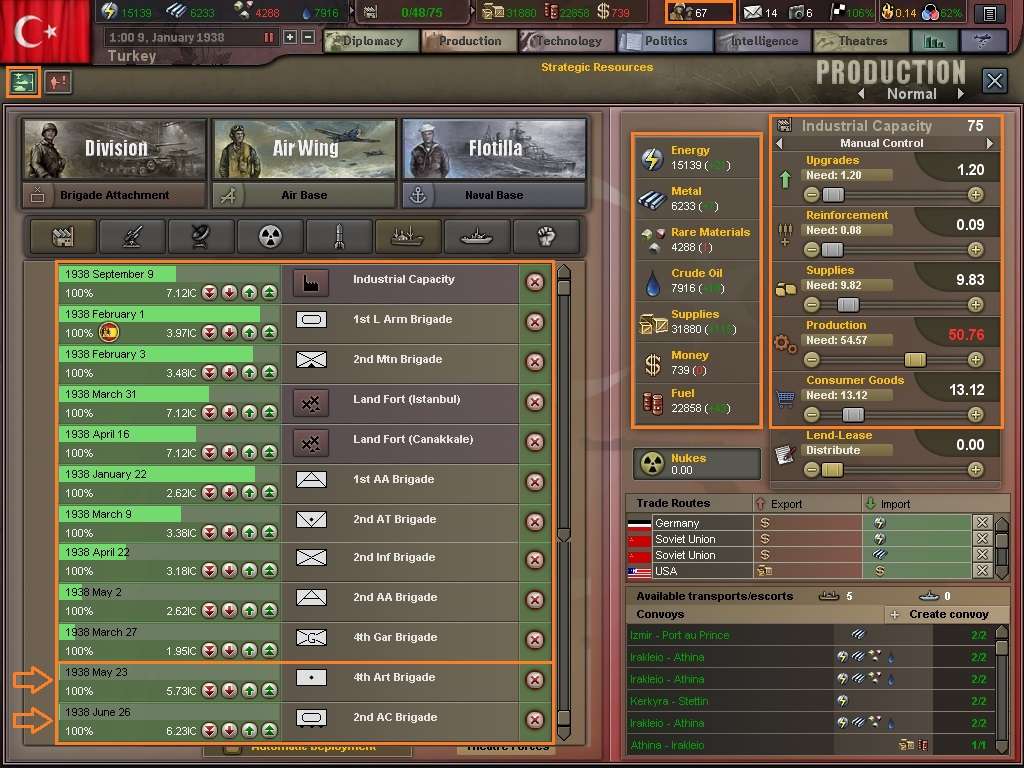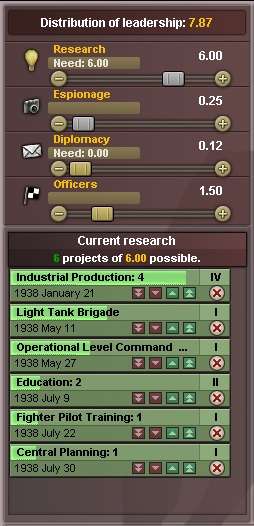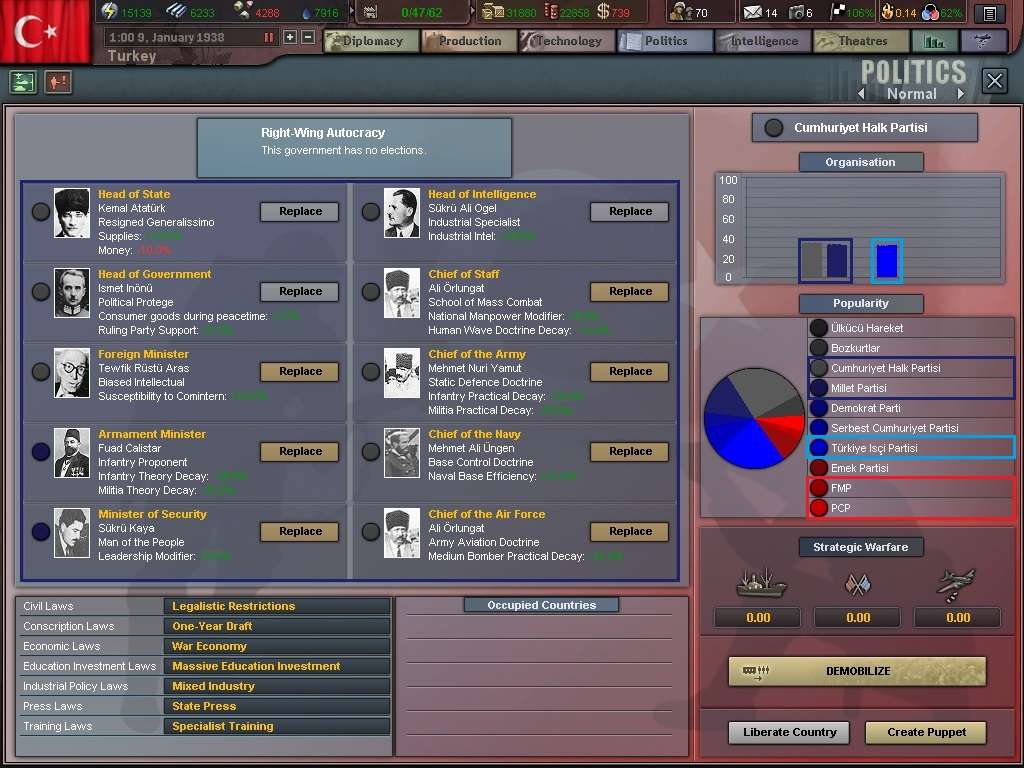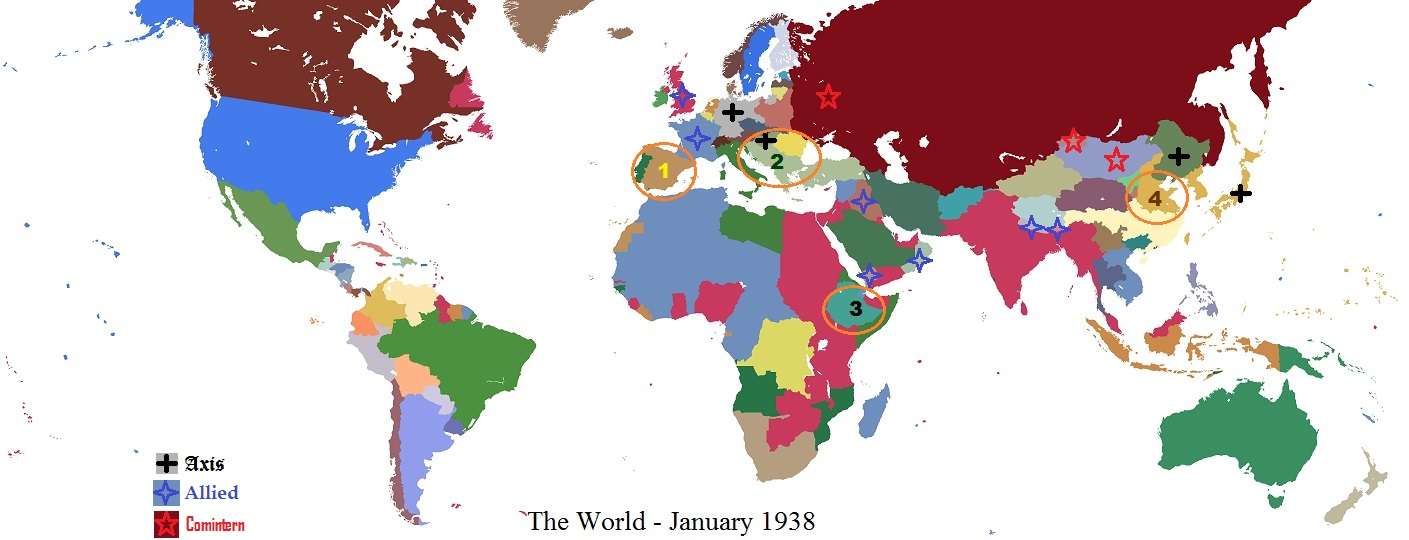Chapter 38: Janus (9 January 1938)
Janus. In ancient Roman religion and myth, Janus is the god of beginnings and transitions, and thereby of gates, doors, doorways, passages and endings. He is usually depicted as having two faces, since he looks to the future and to the past.
Although from Roman mythology, a most appropriate classical reference, given this
is January. The month, subject matter and Turkey’s strategic situation all coincide to make it relevant.
Section 1 – The Yugoslavian Surrender
For some days now, thousands of Yugoslavian troops stranded in the Serbian Pocket
have been surrendering. Now, the surrender is general. Here, Yugoslav soldiers brave
frigid streams near Banja Luka in the north to hand themselves in.
Beograd (pictured here) is designated as the provincial capital of the new Serbian Vilayet.
Repairs are still being made following the battle for the city in November 1937.
Beograd becomes the provincial capital of the new Serbian Vilayet and should make a useful contribution to the Turkish economy.
Sarajevo will become the seat of the new Bosnia-Herzegovina Vilayet. But further to the north, a promise to the Croatian nationalists is honoured. Rather than coming under the administration of a Turkish Bey, the Croatians are granted autonomy under a Principality. They are allowed to take the old Habsburg-era royal flag of the Kingdom of Croatia and Slavonia as their standard.
[Ed: This is a game story artifice as there is no option for Turkey to set up a Croatian puppet state, so there is no practical effect in the game itself. But one should be consistent when one’s word is given.]
Zagreb, the capital of the new autonomous Principality of Croatia.
Key Yugoslavian generals are rounded up and sent to internment in Turkey: can’t have them rabble-rousing in occupied Yugoslavia, can we? The bulk of Yugoslavian soldiers initially interned as POWs will be released, but Security Minister Kaya will need to keep a close eye on
all the occupied territories, especially Yugoslavia and Greece. The Cabinet remembers the original fears that rebellion in the former Yugoslavia could be frequent and hard to contain. Time will tell.
The following morning’s special issue of the Istanbul Times carries summaries of the key news and developments.
Section 2 – Flashback #1: Max Bialystock’s Hotel Room, 9 Dec 37
[Ed: All this grim and serious news – we need a distraction!]
Max Bialystok is sitting in his hotel room, having just pocketed
another check from
another little old lady, when there is a knock at the door. He opens it to see a young man standing there. He just stands there timidly, saying nothing.
“Well, who are you to be disturbing me at this ungodly hour of the day?” Max asks peevishly.
“My name is Leo Bloom. I’m an accountant from New York – the Whitehall and Marks firm, on secondment to their Istanbul office." The young man recovers and gets down to his business. "I was sent here to, ah, review your books. And it’s almost
midday."
“So you’re an accountant, eh?” asks Max grandly. “Yes sir.” Replies Leo.
“Then account for yourself!” Max thunders back at him. Leo, quaking under this verbal assault, takes out the tattered corner of an old blue baby blanket from his pocket, twisting it nervously in his hands.
The boy is clearly not up to such theatrical bombast – he must be new to show business. Max relents: “Never mind, never mind. Do the books. They’re in that desk over there. Top drawer.”
Bloom dutifully goes to the desk and begins removing the books.
“How dare you condemn me without knowing all the facts!” shouts Bialystock. “But sir, I’m not condem …” Bloom begins to reply, before he is cut off.
“Shut up, I’m having a rhetorical conversation!” Max continues, talking to himself: “How humiliating. Max Bialystock – come this this sorry pass.”
He suddenly wheels around and shouts at Bloom. “You know who I
used to be? Max Bialystock! The King of Broadway! Six shows running at once. Lunch at Delmonico’s. Two hundred dollar suits. Look at me. Look at me now! I'm wearing a cardboard belt!” He rips the belt off and holds it in the air.
“I used to have thousands of investors begging, pleading, to put their money into a Max Bialystock production. Look at my investors now.” Max points disgustedly at a picture on his desk of Mrs Artunkal with her Chihuahua, 'Küçük'. “Little old ladies from Istanbul stopping off at Max Bialystock’s hotel room to grab a last thrill on the way to the cemetery.”
Bloom is obviously touched by the once-great producer’s plight. Max draws himself up, “You have exactly ten seconds to change that disgusting look of pity into one of enormous respect. One … two…” Bloom tries hard but looks down at the books. “Just do the books”, Max says wearily. Leo plunges into his work.
Section 3 – World News Summary, 9 Dec 37 – 9 Jan 38
9 Dec 37, London, UK. Joseph P. Kennedy is appointed by President Franklin D. Roosevelt as the Ambassador to the UK. His isolationist views are a concern to many who see Hitler and Fascism more generally as a rising threat. Kennedy rejected the warnings of the prominent politician Winston Churchill that any compromise with Nazi Germany was impossible. Instead, it soon became apparent that Kennedy supported Prime Minister Neville Chamberlain's policy of appeasement. The effect of this on future US foreign policy remains to be seen, but for now, one welcome by-product is the same isolationism is being applied to Turkey. Despite the recent activities, relations with the US remain at
90. Though for now, our requests to buy licenses to update our Air Force to Curtiss P-36s fall on deaf ears.
Joseph P. Kennedy, the new and apparently isolationist, US
Ambassador to the Court of St. James in London, December 1937.
11 Dec 37, Rome, Italy. Italy announces it has quit the League of Nations. No great surprise there. Germany had already withdrawn back on 19 October 1933. Turkey joined on 18 July 1932 and has no intention of quitting (even if it considers the League basically useless). All recent Turkish actions have been taken to right old wrongs, help friends, repel aggression, liberate repressed peoples or forestall Fascist domination in the Balkans. No apologies required! The two countries that would have the most to object about (Germany and Italy) - apart from those recently liquidated - are not even members any longer.
29 Dec 37, Dublin, Ireland. The new Constitution of Ireland went into effect. The Irish Free State was abolished and the country was renamed simply "Ireland" or "Éire".
3 Jan 38, Washington DC, U.S. President Franklin D. Roosevelt delivered the annual State of the Union address to Congress. Acknowledging that the world was in a state of "high tension and disorder," the president stated that "we must keep ourselves adequately strong in self-defense." Roosevelt also called for legislation to "end starvation wages and intolerable hours" as "an essential part of economic recovery."
9 Jan 37: Update on the Sino-Japanese War. The map below summarises Japanese advances in China since 29 November 1937. The pre-war capital
Nanjing has fallen, amid terrible scenes of brutality. Shanghai remains in Chinese hands but is under attack, as is the Shanxi capital of
Yan’an. The capital was moved way to the south in
Guangzhou. Major cities (ie VP locations) are marked, yellow for Japan, green for China, blue for Shanxi. Nationalist Chinese surrender progress is at
71.2%.
Section 4 – Flashback #2: Max Bialystock’s Hotel Room, 9 Dec 37 … a little later
After some time studying the books, a series of coughing and harrumphing noises emerge from Bloom.
“I assume you are making those cartoon noises to attract my attention. Am I correct in my assumption, you fish-faced enemy of the people?” Max asks imperiously. Bloom is clearly wounded. “I have hurt your feelings,” Max continues. Bloom nods. “Good! What is it?”
“I’ve discovered a serious error here in the accounts of your last play.” Bloom warms to his theme. “According to these you raised 600,000 lira for your last play. But the show your produced only cost five hundred and eighty thousand. There’s twenty thousand lira unaccounted for.”
Max brushes this off. “I went to a Turkish bath. Who cares? The show was a flop. What difference does it make?”
Bloom replies: “It makes a great deal of difference. That's fraud. If they found out, you could go to prison. A
Turkish prison.”
“Why should they find out? It's only twenty thousand lira. Bloom, do me a favour, move a few decimal points around. You can do it. You're an accountant. The word 'count' is part of your title.”
Bloom is aghast. “But that’s
cheating!”
“It's not cheating ... it's charity. Bloom, look at me ... look at me! I'm drowning. Other men sail through life. Bialystock has struck a reef. Bloom, I'm going under. I am being sunk by a society that demands success, when all I can offer is failure. Bloom, I'm reaching out to you. Don't send me to jail. Help! Help!” Max is now in tears, hand to forehead, begging.
“Oh dear,” Bloom murmurs to himself, clutching is little square of comfort blanket in a sweaty palm. “Oh, all right, I’ll do it!”
“Thank you Bloom, I knew I could con you.”
“Oh, it’s all right … wha?”
Max hastily covers his Freudian slip. “Nothing. Nothing. Do it, do it!”
Leo Bloom does just that. He is good at his work. “The Turkish Tax Commission wouldn’t be interested in a show that flopped so badly anyway.”
After he finishes, Bloom can be heard musing to himself. “Heh, heh, heh, amazing. It’s absolutely amazing. But under the right circumstances, a producer could make more money with a flop than he could with a hit.”
Max starts paying attention. “Yes, it’s quite possible,” Bloom continues. “If he were to make certain the show would fail, he could make a fortune.”
Max is now hovering over him: “Keep talking!”
“It’s just a matter of creative accounting. It’s very easy.” Bloom is on his special subject now and gets bolder by the minute. “You simply raise more money than you really need. You did it on a small scale, but I’m thinking far bigger than that. You need to go all the way. If you had been a bold criminal, you could have raised
ten million lira.”
Bialystock is the one now all at sea. “But it only cost 600,000. And now I’m wearing a cardboard belt.”
“Ahh, but then you would have trousered the rest. No-one would have expected any return from a one-night flop.” Bloom is quite pleased with himself.
“But what if the play was a hit?” Max wonders.
“Oh, you’d go to jail. Or worse, depending on where the money came from. With so many backers, there’d never be enough profit to pay them off. The jig would be up.”
This has just been an intellectual exercise for the naïve Leo Bloom. But for Max Bialystock, it is a masterstroke. “Aha! So for your scheme to work I need to guarantee a sure-fire flop.”
“What scheme?” Leo asks, confused.
“What scheme? Your scheme, you bloody little genius.”
Leo is now uncertain and wavering. “Oh, no no no. I meant no scheme. I merely posed a little, er, academic accounting theory. It’s just a thought.”
Max is in full flight again, sweeping Leo along in his wake. “Bloom, worlds are turned on such thoughts! First, we find the worst play in the world; second I raise ten million lira there’s a lot of little old ladies in this part of the world; third, you go back to work on the books – phoney lists of backers, one for the government, one for us. You can do it Bloom, you’re a wizard.”
He smiles benignly to Leo. “Fourth, we open and before you can say ‘fifth’ we close. Sixth, we take our millions and fly to Rio de Janeiro!”
Eureka, Max thinks. The solution to all his problems is at hand! This Leo Bloom is a gem
and will easily be persuaded to come along for the ride. For a reasonable percentage.
Max thinks back to the visit from Braanszon and Persephonee earlier that morning. “And I have just the well-heeled suckers in mind to add to all those little old ladies still out there waiting for me.”
Alas, for Max, he who sows the wind …
Section 5 – Campaign Update and State of the Army Report
Campaign Summary. Inönü provides his final update map, showing the campaign from the start and highlighting the last advances from 9 Dec 37 to 8 Jan 38 (marked with dashed arrows) that secured the victory. It matches the original battle plan pretty closely – a little unusual for a military campaign!
Two major battles occurred in the final month of the campaign; both finished previously unfinished business.
- Tuzla was fought out for a win, after which only small battles and minor skirmishes were fought as Sarajevo was occupied and the Race for Split was won by the redoubtable Wehib Pasha and the 1st Cavalry Division.
- In the south, Orbay’s 17 Inf Div won the hard-fought battle in the mountains of Vlasotince to end all serious resistance in the Serbian Pocket.
Romania also performed well, with their 1st Armd Div racing ahead in the north to unsettle and distract the enemy while other Romanian units did their job well supporting the main advance in the north and centre and playing a key role in the elimination of the Pocket. All in all, the Romanian command plus constant objective setting and resetting continued to work surprisingly well, even if Luca Brasi needed to galvanise Antonescu and the Romanian General Staff in the early days of the war!
Army Leadership. Ten months of the on-again, off-again
New Balkan War has built the experience of our land commanders considerably. Most of the seasoned generals are now Level 3, with the top three (Cakmak, Artunkal and Namut) now getting close to Level 4. After a wealth of bold fighting, even the Old Guard Wehib Pasha is closing in on Level 3 status. The new year has also brought in five new generals – a welcome addition given our shortages to date. This will allow all divisions (for now anyway) to be properly commanded, perhaps also allowing an intermediate Army HQ to be established if required. Özalp is the star of the Class of 1938: he starts at Level 2 and has Offensive Doctrine, as do two of his classmates – Turkish RAW War doctrine, pioneered by Inönü, seems to now be spreading. That increases the group of offensive-minded army commanders from one to four!
Navy and Air Force Leadership. Even though there seem to be a number of 'Paradoxian' double-ups with the Land leaders, the small Navy and Air Force command group are well enough served with leaders, if the Air Force is able to actually expand later.
Army Strength. The chart below shows that the main core of the army - the infantry - still only stands at 30 brigades (what it started with) and 4 mountain brigades. The growth since January 1936 has been in four new combat units (one mountain brigade and three garrison brigades) and in supporting units (five ARTY brigades, one AC brigade). One Army HQ has been added. The first anti-tank brigade has been produced in the last few days, but not yet placed. New construction under way will be discussed in the Production and Research Section below.
Infantry Division Tech and Experience. Again using 1 Inf Div as an example, this shows where our INF and ARTY tech and experience is in the field by the end of the war. Many, many gaps. War with Persia or other minors will not particularly expose them, but against an advanced major (ie Germany) … well, that would be another story.
Army Review. The General Staff will conduct another review of the Army’s OOB once existing and new production targets have been factored in and Cabinet has determined what the next strategic priority(ies) will be. At this stage, they envisage a couple of ‘specialist’ defensive divisions being developed to help bolster the
Calistar Line (perhaps each of 2 x INF/1 x AT/1 x AA). The rest will be purpose-built to suit whatever lies ahead.
Section 6 – Flashback #3: Istanbul, Christmas Day, 1937
Braanszon is still stuck trying to think of an imaginative name for the future Peoples Paradise of Turkey.
Hey, he thinks to himself over a Christmas brandy, eggnog and cigar,
would that work? No, probably not, he concludes glumly.
“Persephonee!” he calls out.
She enters, wearing a small but fetching Christmas hat. “Merry Christmas Braanszon.”
“Yeah, Merry Christmas to you too, Perse,” he mumbles distractedly. “How about that new national name – any Yuletide inspiration on that easel of yours?”
“Afraid not, boss,” Persephonee says, for once at loss for a new slogan or catchphrase.
“I suggest we cheer ourselves up by thinking about the new theatrical production,” she continues. “Bialystock has arranged a grand opening in
Ankara, rather than Istanbul. Still no title for the production, though. He says he wants to appeal to the ruling classes with this new ‘hit’, but I’m not sure Ankara has the population or theatre scene to sustain it.”
“We’ll have pay our pet theatrical entrepreneur a little visit in the New Year,” decides Braanszon. “Given we’ve ‘temporarily borrowed’ a decent amount of state funds to invest in this project, we’d better make sure it is proceeding according to plan.”
Ah yes, but to
whose plan …?
That same afternoon, back at Max's hotel room/office …
Leo Bloom is reading yet another script in their search of a sure-fire flop. “Max, it’s Christmas, let’s call it a day. I don’t even know what I’m reading anymore.”
“Read, read,” Max urges. “We’ve got to find the worst play ever written.”
Another hour passes.
“We'll never find it, eh?" Max wails, then comes alive. "Oh, ha, ha, ha, ha, ha!”
Leo looks across to see Max dancing an insane little jig around a script that lies at his feet. “All our Christmases have come at once! Rio, Rolls Royces, wine, women, song and more women!”
“Max, what is it? What are you doing? What's happening?”
“I'll tell you what's happening. We've struck gold. Not fool's gold, but real gold. The mother lode. The mother of them all.”
Leo snatches up the script and starts reading aloud, cinema voice-over style: “’SPRINGTIME FOR HITLER, A Gay Romp with Adolph and Eva in Berchtesgarten.’ Fantastic!”.
“Yes,” laughs Max. “It's practically a love letter to Hitler! And in
Ankara, in the current political climate?”
“It won’t run a week,” says Leo.
“A week? Are you kidding? This play has got to close in the first act.”
“Who wrote it?” asks Leo.
“Some guy called Franz Liebkind,” replies Max. "According to this note, it looks like he’s a German military adviser who stayed in Istanbul after the Great War. Let’s pay him a visit.”
Section 7 – Production, Resources and Research
Production and Resources. With the end of the war, peacetime economic laws resume, but Turkish industry is now in a quite a strong position, even with the additional requirement for Consumer Goods. With the completion of the first Turkish anti-tank brigade and with upgrades and reinforcement requirements now minimal, a new artillery brigade and a second armoured car brigade are commenced.
The success of the 1 Cav Div experiment has been such that the general staff want another mobile force of this nature. Turkey’s first (licensed) light armoured brigade is near completion, as is a new mountain brigade. The first
Calistar Line forts are a couple of months off, but should at least start to increase infrastructure practical. The new IC is still many months away from completion: it is uncertain whether it will end up paying its way, but the experiment will be seen through. A second AT brigade and two AA brigades are under training: these should be sufficient to enable the proposed two specialist defensive divisions to be completed by mid-year (with some standard infantry brigades either under construction or reorganised from elsewhere within the orbat).
Resources are looking good and the budget is virtually balanced. Plenty of cash in the bank after recent conquests – but nothing useful to spend it on yet! Manpower sits at 67 (after the commencement of the two new units): the monthly rate of increase is up from
1.4 in January 1936 and
1.5 in January 1937 to
2.0 now. Not a lot, especially given we need to keep a reserve for expected higher casualty rates in a future general war.
Research. Research has been reviewed quite recently, so will be dealt with briefly here. Some minor adjustments are made, with espionage being reduced further (reserve spy numbers remain healthy), diplomacy slightly increased (in case we are ever able to buy another aircraft or armour license) and officer training again increased (for units already on the drawing board and to try to get as close to the desired
140% mark as possible).
Section 8 – Politics and Intelligence
Politics. This chronicle has not paid much attention yet to politics. Domestic spies have concentrated on base-level counter-espionage (still no discernible indications of foreign interference or spies caught) and mainly raising national unity, which started quite low in 1936 (54.998% in Jan 36, up to 62.599% now). Nothing has been done for ruling party organisation.
Polling figures over the last two years have been reviewed. A couple of trends have emerged, although party popularity seems to fluctuate for no obvious reason.
- First, it should be noted that the Turkish Government is a Right-Wing Autocracy, led by the ‘paternal autocrat’ Cumhuriyet Halk Partisi (CHP) of Atatürk and Inönü, in coalition with the ‘social conservative’ Millet Partisi (MP), represented in Cabinet by Armaments Minister Calistar and Security Minister Kaya. The more right-wing parties – a motley group of Fascists and National Socialists – are not the natural allies of the ruling CHP (in this time line anyway). They are small, marginal and out of favour.
- The two centrist parties – the Demokrat Parti and the Serbest Cumhuriyet Partisi – are both relatively small and waver in their support from one bloc to another, though have risen in popularity over time.
- The main opposition is provided by the ‘social democrat’ Turkiye Isci Partisi (TIP).
- On the left, the ‘left-wing radical’ Emek Partisi has the highest support but is probably closer to the social democrats than the communists. The FMP (Leninist) and PCP (Stalinist) are still small and marginal but (perhaps not surprisingly due to recent re-alignment to the Comintern) are more popular than they were in 1936 (when they were virtually non-existent).
Some main trends:
- Combined support for the CHP/MP ruling coalition has steadily dropped from 62% in Jan 36, to 54% in Jul 36, 48% in Jan 37, 43% in Jul 37 to only 40% in Jan 38. The CHP fell from 40% in Jan 36 to 26% in Jan 38, with the MP declining from 22% to 14% over the same time.
- The opposition TIP has also fallen from 34% in Jan 36 to 23% in Jan 38.
- The main beneficiaries of the loss in major party support over the same time seems to be the Fascist Bozkurtlar (from 0 to 7%); the two small centrist parties (combined 4% up to 14%) and the leftists in general (Emek Partisi 0 to 8% and the combined Communists from 1% to 8%).
Over all this time, party organisation (only displayed for the three largest parties, with notional Cabinet position ‘quotas’ – ie. the CHP 35%, MP 33% and TIP 32%) has remain unchanged.
Now, other than the ‘fractured government’ factor (which I’ve always thought was too small to worry about), if there are any HOI3 political experts out there who know if any of this is at all significant or is likely to have any meaningful effect in-game (especially for a right-wing government planning on joining the Comintern), your wise counsel will be welcome.
Intelligence. No change there since the recent review, except we now have six spare spies (hence cranking back again on LS allocated to intel). 10 spies at home, focus on NU and C-E; 10 in France, focus on C-E and tech. No other spy networks being actively maintained, but four spies lie dormant in Romania with no active mission.
Section 9 – Diplomacy
In this crazy alternate world, there seems to have been no further international reaction to the completion of the
New Balkan War and the cementing of Turkey as the regional hegemon. The threat levels for our immediate Axis competitors (Germany and Hungary) and Italy (not yet in the Axis) remain the same they were when the invasion of Yugoslavia commenced – we’ve already taken that opinion hit. Any one of those three could attack us if they wanted to, but seem happy to keep on appeasing us. We have at least created a useful precedent for them and they are probably intent on other objectives that don’t concern the Balkans - for now anyway, while they can still import enough oil for their purposes.
- Germany and Hungary: both neutrality 21, Turkish threat 28.0.
- Italy: neutrality 28, Turkish threat 31.5.
- Soviet Union: neutrality 49, Turkish threat 30.4.
Austria remains independent for now but is firmly lodged in the Axis camp. Whether by joining the Axis or through absorption (which the Nazis are agitating for), that will soon become another Axis border for us, no doubt.
Of the major powers, our best relations are with the US
(+90). They seem willing to trade when asked, but
not for licenses. Of course, relations are best with Romania at
200. But even
they won’t sell us a license for a lousy PZL P.11c+ INT wing! I hope this lack of ability to obtain licenses for more modern equipment changes over time. Again, if any HOI3 arms merchants or acquisition specialists out there know what may be affecting this (other than Turkey’s extreme recent aggression towards its neighbours) or if it is likely to change after a period, your advice would be welcomed!
Relations with other major powers are:
- 75 – Japan and Italy
- 30 – Soviets
- 15 – Germany
- 0 – UK and France
Alignment. Our ‘diplomatic distance’ from the
Comintern is now down to 130.66 (target is 50). In Jan 37 this was 275.90. Realignment started in Mar 37 and in Jul 37 was 246.63. Were it to continue at this rate we would be able to gain the option of joining our Russian Socialist Brothers (!?!) ahead of time, but our original calculations factored in interference from other powers plus other political factors slowing the rate of alignment as it draws near to the critical point.
The world in 1938. The factions remain limited in scope. A few conflicts and hotspots that have occurred since January 1936 are marked.
- The Spanish Civil War, started 6 Aug 36, won by the Nationalists on 27 Oct 37.
- The New Balkan War (Turkey against Bulgaria, Greece, Romania, Albania and Yugoslavia, in succession), 15 Mar 37 to 8 Jan 38.
- Ethiopia, Italy invaded in October 35, won by Italy, Ethiopia made a puppet state on 13 Mar 36.
- The Sino-Japanese War, started by Japan on 6 Sep 37, continuing.
Section 10 – Flashback #4: Istanbul, Christmas Evening, 1937
Leo Bloom and Max Bialystock arrive at a seedy looking apartment building in downtown Istanbul. They call in on the building superintendent, a tough-looking woman of middle age. “We are seeking Mr Franz Liebkind,” announces Max imperiously.
“Oh, the Kraut. He’s on the top floor, Apartment 23,” she answers. As they start up the stairs, she calls out, “But you won't find him there. He's up on the roof with his birds. He keeps birds. Dirty, disgusting, filthy, lice-ridden birds. You used to be able to sit out on the stoop like a person. Not anymore. No sir. Birds! You get my drift?”
“We … uh … get your drift. Thank you, Madam,” replies Leo politely, if somewhat bewildered.
“I’m not a madam, I’m a concierge,” she answers, spitting on the floor. They escape upstairs as quickly as they can.
They find Franz on the roof. He wears a German coal-scuttle helmet. And is talking lovingly to his birds, which are in a coop. He holds a small picture in his hands.
“Franz Liebkind?” asks Max. Franz is startled; he hadn’t heard them coming. He quickly stashes a picture of Adolf Hitler under his helmet. Speaking with a strong German accent, he responds in a rush: “I vas never a member of the Nazi Party. I am not responsible. I only followed orders. Vhy do you persecute me? My papers are in order. I love this country.” He sings the first few bars of the Turkish National Anthem, then examines them suspiciously. “Who are you?”
Max tries to reassure him, “Mr. Liebkind, relax, relax, we're not from the Government. We came here to talk to you about your play.”
“My play? You mean, ‘Springtime For ... ‘, er, you know who?”
“Yes.”
“
Vat about it?”
“We loved it,” Max reassures him. “We thought it was a masterpiece. That's why we're here. We want to produce it in Ankara.” Leo reaches into his briefcase and brings out a contract.
Liebkind now veers into uninhibited (indeed, quite unhinged) euphoria, “Oh joy of joys! Oh, dream of dreams! I can't believe it.” He turns to the pigeons: “Birds, birds, do you hear? Otto, Bertz, Heintz, Hans, Wolfgang, do you hear? Ve are going to clear the Fuhrer's name. Fly, fly, spread the words.” He sets the birds free and now bursts into an enthusiastic rendition of
Deutchland Uber Alles!
Bloom and Bialystock look at each other in alarm. They finally calm him down, explaining that people will hear him. Liebkind switches back to the Turkish anthem again.
He then invites them down to his flat, for Schnapps. He toasts Adolf Hitler “The greatest man who has ever lived.” Bloom quietly toasts “Sigmund Freud” to himself; Max toasts “Max Bialystock.”
That ordeal over, they take the signed contract and beat a hasty retreat. Max thinks Franz a harmless nut. He will discover otherwise, in due course. But for now, they have their sure-fire flop and look to start casting. Max dashes off to the ‘Blue Gypsy’, where he is due to meet another elderly ‘investor’.
Coming up: Another fateful Cabinet Meeting will be held to decide Turkey's next steps and long term plans. Will attacking Hungary be considered as a serious option, even if they are now a member of the Axis? Will the Hawks and Doves (if there are any of the latter left in Cabinet these days) clash over the Persian Question? Are there any other realistic options, other than building and waiting for the next opportunity and/or general war? Meanwhile, Braanszon and Persephonee divide their time between propaganda, national naming duties and theatrical investment. And
what is Luca Brasi up to during his ‘vacation’ in Istanbul? Brasi
never takes vacations!
. And did the Pendragons ever conquer that much territory in ten months
? But enough of these incomparable comparisons between different ages, you can once again rest assured that a pacifist course is not the game plan. Even the most exacting warrior must prepare diligently for their next adventure. And those preparations are already in train in Turkey.


